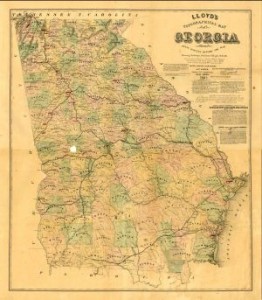 Confederate cavalry continue harassing, albeit largely ineffectively, Union troops in north Georgia. The game of cat and mouse between the Rebels and the Federals will go on for some weeks, with Union General William T. Sherman growing ever more frustrated with an elusive, albeit weak, enemy.
Confederate cavalry continue harassing, albeit largely ineffectively, Union troops in north Georgia. The game of cat and mouse between the Rebels and the Federals will go on for some weeks, with Union General William T. Sherman growing ever more frustrated with an elusive, albeit weak, enemy.
Yet for the Rebel forces of significantly inferior numbers, hit and run tactics are about the best they can now hope for in Georgia.
Meanwhile, many residents of Atlanta have relocated to other cites, particularly the middle Georgia town of Macon.
In some cases, however, families ask for and receive permission to move northward. Such is the case with the Richard family, former Union sympathizers and opponents of secession who now want to relocate far away from any battlefield action.
The Richards are Baptists, members of Atlanta’s Second Baptist Church. Today they are scheduled to leave their home and become “exiles and wanderers upon the earth with no certain dwelling-places.” However, instead of departing, a delay in obtaining a passport creates a great deal of tension and anxiety. Finally, by the end of the day Samuel Richards secures a pass to Jeffersonville, Indiana, across the Ohio River from St. Louis.
Thus on the morrow they leave for Indiana, with no further complications. Once there, the family travels on to New York, where they settle for several years, enjoying a respite from the horrors of war.
Collectively, the largely impotent nature of the Confederate’s Army of Tennessee and the forced emptying of citizens from Atlanta (a previously important city in the Confederacy) attests to a nation, in its Deep South states, powerless before the enemy.
Powerless, yet helmed by white slaveholders unwilling to admit defeat.
Source: Samuel Pearce Richards, edited by Wendy Hamand Venet, Sam Richards’s Civil War diary: a Chronicle of the Atlanta Home Front, Athens: University of Georgia Press, 2009, p. 237-238 (link)


